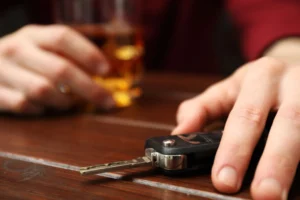There’s no way around it, being involved in a car accident is awful. The accident itself puts your life in danger, but the aftermath can be just as bad, leaving you overwhelmed and uncertain about your next steps. If you or a loved one has been in a car accident in Texas, first things first, make sure everyone is safe and get medical attention — even if injuries are not apparent.
Knowing what to do after a car accident in Texas can make a significant difference in protecting your health, rights, and financial well-being. This guide outlines the following steps to take after a car accident:
- Prioritize safety and seek medical attention
- Call the police
- Gather information and document the scene
- Notify your insurance company
- Seek legal advice
We’ll also discuss the legal landscape in Texas, how a Laredo personal injury lawyer can help, and a few common questions about Texas car accidents. If you need assistance, call Guzman Law Firm at (956) 516-7198, and our team will guide you every step of the way.
Understanding Texas car accident laws
While Texas is an at-fault state — meaning the driver who caused the accident is financially responsible for damages — the state also follows a modified comparative negligence rule. So, if you’re found to be 51% or more at fault, you’re ineligible for compensation.
With this in mind, who pays for a car accident in Texas then? If you’re less than 50% at fault, you can seek compensation through:
- The at-fault driver’s insurance: Filing a car accident claim with their liability coverage.
- Your insurance: If the at-fault driver is uninsured or underinsured, your policy may cover damages under uninsured/underinsured motorist coverage.
- A personal injury lawsuit: If insurance negotiations fail, or they refuse to offer you what you really deserve, you can file a lawsuit to recover damages.
Keep in mind: the statute of limitations for filing a personal injury lawsuit in Texas is two years from the date of the accident. Missing this deadline can bar you from pursuing compensation, so if you’ve been in an accident, you need to act immediately.
If police find that alcohol was involved on your part of the accident, you need to contact a DWI defense attorney right away!
What to do when you have a car accident in Texas?
1. Prioritize safety and seek medical attention
- Check yourself and passengers for injuries. If anyone is hurt, call 911 immediately.
- Move to a safe location, such as the shoulder of the road, to avoid further accidents.
The first priority after any car accident is ensuring the safety of all involved. If possible, move your vehicle to the side of the road to prevent further collisions. Turn on your hazard lights and check yourself and passengers for injuries. Emergency responders can assess injuries and document the accident, which is critical for insurance and legal claims.
Even if you feel fine, you’ll want to see a doctor immediately after an accident. Some injuries, like whiplash or internal bleeding, may not be immediately apparent but can worsen without treatment. A medical report also serves as valuable evidence in personal injury claims.
2. Call the police
- Notify law enforcement, even for minor accidents, to ensure an official accident report is filed.
- Cooperate with the police but avoid making speculative statements without legal counsel.
When speaking with the other driver, witnesses, or law enforcement, avoid admitting fault or making statements that could be interpreted as such. Texas operates under a comparative negligence rule, which means fault can be apportioned between parties, potentially reducing your compensation if you’re found partially at fault.
3. Gather information and document the scene
- Take photos of the vehicles, damages, injuries, and the surrounding area.
- Gather contact and insurance information from all involved parties.
Exchange contact and insurance information with the other driver(s). Take photos of the vehicles, damage, license plates, road conditions, and any visible injuries. This evidence can strengthen your case if a dispute arises. If there are witnesses, ask for their contact information and a brief statement of what they saw. Their statements may be valuable in proving liability.
4. Notify your insurance company
- Report the accident promptly but stick to the facts.
- Avoid giving recorded statements without legal guidance.
Report the accident to your insurance provider as quickly as possible. Be honest but concise, and only share facts, as opposed to subjective details that could be misinterpreted by the adjuster. Avoid giving recorded statements or accepting settlement offers without consulting a car or truck accident attorney in Laredo.
5. Seek legal advice
- Contact a Texas personal injury attorney to ensure your rights are protected and receive guidance on navigating the claims process.
A knowledgeable attorney can guide you through the complexities of Texas car accident laws, and help ensure you receive fair compensation for medical bills, lost wages, and pain and suffering. Reach out to Guzman Law Firm to protect your rights and navigate this challenging process.
How a Texas personal injury attorney can help
A personal injury attorney’s role extends far beyond filing paperwork. When building your case, they serve as your advocate by coordinating with several key parties, each playing a vital role in strengthening your position:
- Witnesses: Attorneys can collect witness statements and ensure they are documented accurately. Witness testimony often plays a critical role in determining fault.
- Law enforcement: An attorney can obtain and analyze police reports to uncover inconsistencies or confirm details that support your claim. They may also represent you in conversations with law enforcement to ensure your rights are upheld.
- Medical personnel: Your attorney can communicate with your healthcare providers to obtain medical records and expert testimony about your injuries, linking them to the accident.
- Auto professionals: Damage to your vehicle can serve as evidence of the severity and mechanics of the crash. An attorney can work with mechanics or auto experts to provide detailed assessments.
- Insurance companies: Insurance companies often aim to minimize payouts. A personal injury attorney negotiates with adjusters on your behalf, fighting for a fair settlement that reflects the true cost of your injuries and losses. Can you sue the insurance company? Yes, if negotiating with insurance companies proves fruitless, your attorney can take the case to court.
This approach often reveals helpful evidence that might otherwise be missed. For example, a witness statement might corroborate the timing shown in traffic camera footage, while medical records demonstrate how the impact angles align with your specific injuries. These interconnected pieces of evidence, when properly assembled, create a compelling narrative that’s far more persuasive than isolated facts alone.
FAQ: Common questions about car accidents in Texas
Do you need a police report to file an insurance claim in Texas?
While not legally required, a police report significantly strengthens your insurance claim and speeds up the process. Insurance companies often require one for claims involving injuries or significant damage, as it serves as an unbiased account of the accident. Even a basic incident report can prove invaluable when dealing with adjusters.
Should you call the police for a minor accident in Texas?
Texas law requires calling the police if there are injuries or property damage exceeding $1,000. Even for minor accidents, it’s recommended because damage costs are often higher than they appear, and some injuries may not be immediately obvious. A police report also protects you if the other driver later changes their story.
How long after a car accident can I claim injury?
Texas has a two-year statute of limitations for filing a personal injury lawsuit. However, you should report injuries to your insurance company as soon as possible, ideally within days of the accident, as most insurance policies have specific notification requirements, typically within 30 days. Beyond that, evidence in car accident claims can dissipate quickly, and the faster you move the easier your case will be to build.
Will my insurance go up if I don’t make a claim?
Your rates may still increase if the other driver reports the accident or if a police report is filed, as insurance companies access accident databases during policy renewals. Not reporting an accident when your policy requires it could also jeopardize future coverage.
What happens if you get insurance after an accident in Texas?
Insurance policies cannot be backdated to cover past accidents. If you were driving without insurance during the accident, you could face fines, license suspension, and personal liability for damages, as Texas requires continuous auto insurance coverage.
Let Guzman Law Firm secure your rights following a car accident.
A car accident can upend your life, but knowing what to do after a car accident in Texas can make the recovery process smoother. From ensuring safety at the scene to navigating Texas’s at-fault legal system, each action you take matters. Working with a personal injury attorney like Javier Guzman can ease the burden and improve your chances of obtaining fair compensation.
If you’ve been involved in a car accident in Texas, contact Guzman Law Firm or call us at (956) 516-7198 to protect your rights and help you get back on track. Don’t face this challenge alone — let us fight for you.
More Helpful Articles by Guzman Law Firm:
- Can You Sue the Insurance Company?
- What’s the Difference Between DWI vs DUI in Texas
- First DWI in Texas: What to Expect
- What to Look for in a Divorce Lawyer in San Antonio
- What Are the Federal Drug Trafficking Sentencing Guidelines?





